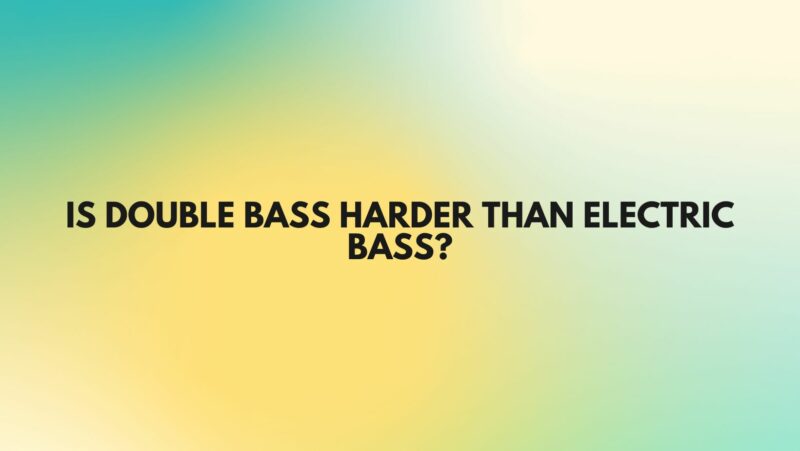The world of music is a diverse and fascinating realm filled with an array of instruments, each with its own set of unique characteristics and challenges. Among these instruments, the double bass and the electric bass guitar stand out as fundamental components of various musical genres. While they share the role of providing the low-end foundation in music, they differ significantly in terms of size, technique, and musical context. In this comprehensive article, we will explore the question: Is the double bass harder to play than the electric bass guitar?
Understanding the Double Bass
The double bass, often referred to as the upright bass or simply the bass, is a massive, wooden, and stringed instrument. It holds the distinction of being the largest and lowest-pitched member of the string instrument family. This instrument, with its profound and resonant tones, plays a pivotal role in classical, jazz, and other genres. Traditionally played standing up, or seated on a tall stool, it can be bowed or plucked, depending on the style of music.
Challenges of the Double Bass
- Physical Demands: The double bass is a physically demanding instrument due to its sheer size and weight. Standing at approximately six feet tall with a large body, handling and transporting it can be challenging. Maintaining the correct playing posture is vital for comfort and effective performance.
- Finger Technique: To produce clear, in-tune notes, double bassists require specific finger strength and dexterity. The wide spacing between the strings can make accurate finger placement a challenge, particularly for beginners.
- Bowing Technique: For those who choose to use a bow, mastering bowing technique is an art that demands control over tone, dynamics, and articulation, often taking years to refine.
- Intonation: Due to the length and thickness of the strings, maintaining precise intonation can be challenging and requires constant attention.
- Repertoire Complexity: The double bass repertoire spans from beginner-friendly pieces to highly intricate compositions that demand advanced techniques and musical interpretation.
Understanding the Electric Bass Guitar
In contrast, the electric bass guitar, commonly known as the bass guitar or simply the bass, is a sibling of the electric guitar and is part of the rhythm section in contemporary music. Typically equipped with four strings, the bass guitar is played horizontally, either resting on the player’s lap or supported by a strap. It generates lower-pitched notes that serve as the rhythmic and harmonic foundation in various musical genres such as rock, funk, pop, and more.
Challenges of the Electric Bass Guitar
- Fretting Technique: Bass guitarists must develop strength and dexterity in their fretting hand to produce clear notes. Although the strings are closer together compared to the double bass, building finger strength remains essential.
- Rhythmic Precision: The bass guitar often plays a critical role in maintaining the groove within a band, necessitating impeccable timing and rhythmic precision.
- Tonal Variations: Achieving various tones on a bass guitar can be challenging. Bassists employ techniques like plucking, slapping, and popping to create different timbres, which require time and practice to master.
- Musical Context: The role of the bass guitar is closely tied to the musical context. Bassists must adapt their playing style to fit the genre and the needs of the ensemble.
Comparing the Challenges
The determination of whether the double bass is harder to play than the electric bass guitar is contingent on various factors:
- Physicality: The double bass is physically larger and heavier, making it more physically demanding to handle than the electric bass guitar. This can be a significant consideration for some musicians.
- Technical Demands: Both instruments present their unique technical challenges. The double bass may have a steeper learning curve due to its size and complex techniques like bowing, but the electric bass guitar demands precision in timing and tone production.
- Musical Context: The role and musical context of each instrument differ greatly. The double bass is versatile and spans various styles, whereas the electric bass guitar is typically associated with contemporary music.
- Personal Preferences: Ultimately, the perceived difficulty of an instrument is subjective and may depend on an individual’s musical preferences, prior experience, and goals.
Conclusion
In conclusion, the question of whether the double bass is harder to play than the electric bass guitar does not have a definitive answer. Both instruments offer unique challenges and rewards. Some musicians may find the physical demands and techniques of the double bass more challenging, while others may prefer the rhythmic precision and tonal versatility of the electric bass guitar.
Ultimately, the choice between these instruments should be guided by one’s musical interests, goals, and personal preferences. Regardless of which instrument a musician selects, the journey of learning and mastering the double bass or the electric bass guitar is a rewarding and enriching musical pursuit.


